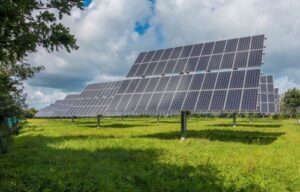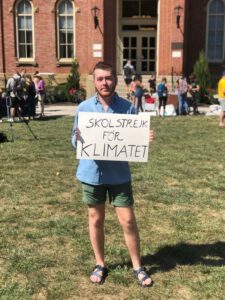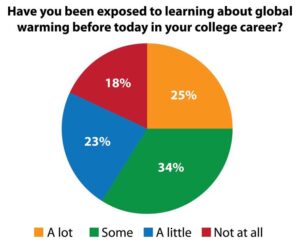‘They Love to Tout They’re Green’: Pushing for University Action on Climate Change
 Colleges and universities are massive hubs of education, research, and innovation. As more and more data on climate change is produced by faculty and students at the world’s leading universities, the college campus has been transformed into a sustainability mecca. Facilities upgrades in the form of recycling and composting operations, HVAC-system repairs, and renewable energy projects on college campuses continue to make national news. Just recently, Penn State partnered with Lightsource bp to supply almost 25% of the University’s state-wide electricity needs, thereby reducing the University’s overall greenhouse gas emissions by 57,000 metric tons of CO2e per year. Projects such as these exemplify the facilities changes that colleges and universities are willing to invest in for the future.
Colleges and universities are massive hubs of education, research, and innovation. As more and more data on climate change is produced by faculty and students at the world’s leading universities, the college campus has been transformed into a sustainability mecca. Facilities upgrades in the form of recycling and composting operations, HVAC-system repairs, and renewable energy projects on college campuses continue to make national news. Just recently, Penn State partnered with Lightsource bp to supply almost 25% of the University’s state-wide electricity needs, thereby reducing the University’s overall greenhouse gas emissions by 57,000 metric tons of CO2e per year. Projects such as these exemplify the facilities changes that colleges and universities are willing to invest in for the future.
Students are often bombarded with a variety of options on campus to engage with sustainability as well. From reusable take-out containers available in dining halls to siloed research opportunities assessing the potential energy savings of switching to LED light bulbs in on-campus buildings, sustainability is directly embedded within the college experience. As climate change has become a well-known phenomenon and issue in recent decades, coursework on causes, consequences, and solutions has become more mainstream, with students at various universities across the United States exposed to climate change concepts in some capacity.
Exposure to education on global warming and climate change at the university level was evident in my survey research introduced in my earlier RCC article “Visualizing Climate Change.” 420 undergraduate students at West Virginia University were asked about their perceptions, beliefs, and opinions of global warming in the Spring 2020 semester. One question asked, “Have you been exposed to learning about global warming before today in your college career?” Out of 404 responses to this particular question, 332 (82%) said that they had, with 100 (25%) saying they were exposed to learning about global warming a lot in their college career.
Despite such exposure, colleges and universities should be doing more on climate action. In 28 qualitative interviews with LGBTQ+ college students across 5 large, public universities in Appalachia, most respondents found themselves frustrated by lack of climate action at their respective institutions. The responses below encapsulate feelings across most participants:
“App. State says they’re doing a lot for the environment. “Sustainability is one of our number one thing!” Yeah, we have a great department for it, but the President of our school doesn’t give a sh*t about it. . . Professors are very open and are vocal too, but administration doesn’t do anything. . .I think they need to stop faking how sustainable they are when we’re not. A wind turbine that we have on campus is not in the right spot, it’s not generating enough power to pay it off, or even be remotely useful. The solar panels on campus don’t work, they’re just for show apparently. They just need to stop pretending is really what it is.” Interview 15
“UK [University of Kentucky] is always improving our campus. There’s always some kind of construction, large scale going on. They’ve been redoing buildings for the past 10 years. They’re always trying to improve campus. . . but it’s not always clear that there’s anything environmentally focused about those improvements. We have huge classroom buildings to accommodate our gigantic student body, but there’s never really an environmental component to these new changes. There’s obviously a very strong aesthetic, and technological improvement going on these buildings, but there’s never any kind of point that they brag about for environmentalism, or ‘These buildings have better heating systems, so we’re using less electricity.’ There’s never anything like that.” Interview 7
“App. State is a college that loves to tout that it’s green which I question, personally. The college itself does a lot of its naturalist and in green initiatives to get more students to come and to get more money. I think really what they care about is the football team doing well at this moment in time and increasing their student population by margin every year. That compounding growth is something that I don’t think is sustainable at all. And they tout the sustainable initiative. I definitely think that the students on campus care a lot of them do. But I think the campus itself does just enough to seem like they do.” Interview 28
As these excerpts show, despite ‘sustainable’ upgrades on campus, students wonder if these changes are truly making an impact. Universities must not only talk about how sustainable they are, but actually make sure that their sustainability initiatives are making a measurable impact. It is not enough just to educate future generations on climate change, but to produce large-scale mitigation strategies on their campuses. As leaders of both education and research, colleges and universities have the power (and often, the money and resources) to be leaders on the climate crisis. With leadership must come decisive action.
 One way to take meaningful action is for universities to divest from fossil fuels. For example, Rachel Carson Fellow Emily Irigoyen leads the divestment campaign on Vanderbilt’s campus. Student activists have proven key in pressuring campus administrations to take drastic measures for the sake of the climate. Despite divestment being an uphill battle, high-profile universities such as Cambridge and Georgetown have pledged to divest in the future.
One way to take meaningful action is for universities to divest from fossil fuels. For example, Rachel Carson Fellow Emily Irigoyen leads the divestment campaign on Vanderbilt’s campus. Student activists have proven key in pressuring campus administrations to take drastic measures for the sake of the climate. Despite divestment being an uphill battle, high-profile universities such as Cambridge and Georgetown have pledged to divest in the future.
Just recently, Rachel Carson Fellow Lindsey Nystrom’s calculated divestment campaign transpired in UNC Asheville committing to carbon neutrality by 2050. As the adverse effects of climate change continue to increase in intensity and frequency in the near future, changes such as these at the university level are crucial to the livelihoods of current and future generations of college students. As my interviewees show, more visibility and serious action on sustainability is warranted.
As a student at West Virginia University, I believe the University can also do much better when it comes to climate action. Expanding education programing, divesting from fossil fuels, and implementing green initiatives in campus buildings, dormitories, and dining halls are all necessary steps to achieving campus sustainability. West Virginia University as a leading, large-scale research institution in Appalachia stands to be a leader on the climate crisis. It is time they start acting like one.
Partial funding for this masters research was made possible by the Appalachian Stewardship Foundation.
 Brandon Rothrock – Rachel Carson Council Fellow
Brandon Rothrock – Rachel Carson Council Fellow
Brandon Rothrock is working on a Master of Arts in Geography and a Graduate Certificate in Women’s and Gender Studies at theWest Virginia University. His RCC project is on climate justice and the LGBTQ+ community. [email protected]
![]() The Rachel Carson Council depends on tax-deductible gifts from concerned individuals like you. Please help if you can.
The Rachel Carson Council depends on tax-deductible gifts from concerned individuals like you. Please help if you can.
![]() Sign up here to receive the RCC E-News and other RCC newsletters, information and alerts.
Sign up here to receive the RCC E-News and other RCC newsletters, information and alerts.








